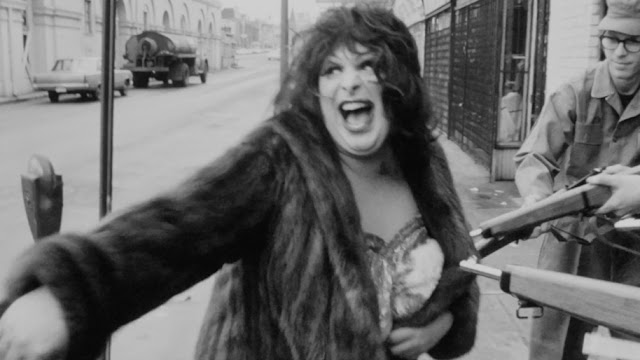
Drag became an essential part of director John Waters' repertoire from the beginning, in the person of his friend, Glenn Milstead, whom he dubbed "Divine", taking a cue from Warhol's self-proclaimed, one-name "superstars" like Viva and Ondine. Their first attempt, the "experimental" short
Roman Candles (1966) basically hasn't seen the light of day since, though Waters recently mentioned to TCM host and Academy president Jacqueline Stewart that it's been preserved in the Academy archives. One of the big regrets of my life is that I didn't cut out of work when John showed the next film,
Eat Your Makeup (1968), in the hall of the local Methodist church, a standard practice in those days of hauling his films around himself. It doesn't get shown either, but has the notoriety of having depicted the Kennedy assassination, with Divine as Jackie. John insisted on pushing just about every button he could find and that's a good example of both his intention and talent to offend.

From there John got more ambitious and more serious with the ultra-black comedy
Mondo Trasho (1969), featuring Divine in a series of very surreal adventures around Baltimore, taking its cue from the popular "Mondo"-themed movies of the 60's by being as tasteless as possible. This is the one in which Divine became both the actress and the character, fusing the identity onscreen and off. Much of the film is played in a tight two piece gold lame outfit, part of John's intention to create his own version of a bombshell a-la Jayne Mansfield.

Next came
Multiple Maniacs (1970), the first one to get real attention from the press and the first with a semi-coherent script as opposed to being an improvisational free-for-all.

This is the one which started to position the character as "the filthiest person alive", which she would officially become in the next film. Divine is proprietor of Lady Divine's Cavalcade of Perversions, a travelling tent show putting down stakes in suburban neighborhoods to lure in housewives and then rob them. The rest of the movie follows her trajectory from master criminal to a literal monster after being ravaged by a giant lobster, sending her foaming at the mouth into the streets of Baltimore to be gunned down by the National Guard. Just a normal day in Waters world.

Next, of course, was the biggie which put Waters and Divine on the map,
Pink Flamingos (1972), modestly billed as an exercise in bad taste. It almost single-handedly created the Midnight Movie phenomenon and led to international interest. The movie centers on Babs Johnson (Divine) and her family, whose raison d'etre as the filthiest people alive is threatened by a couple bent on supplanting them. If you've seen it, I'm sure your memory will serve you better than my words could. If not, be prepared for some pretty gross stuff if you do watch it. The whole point was to test limits and that it did. Who can forget this image, variations of which still appear in new contexts today?

Next came John's big pivot toward the mainstream,
Female Trouble (1974), in which his development as a director showed in a more coherent script, stable as opposed to hand-held camera setups, and more formal screen compositions. This is the one which finally looks more like a low-budget movie than a home movie and Divine reaped the rewards by looking the best he ever had in drag, from teenage years, to young motherhood, to a life of crime, to the electric chair. Eat your heart out, Susan Hayward. The teenage Dawn Davenport and her high school buds Cookie Mueller and Susan Walsh perfectly capture that spirit of teenage alienation most of us can understand.
This movie also featured "the walk", John's homage to Jayne Mansfield's walk in the street in Frank Tashlin's
The Girl Can't Help It (1956), which he had also used in
Pink Flamingos, featuring Divine free-styling in the streets of Baltimore. Definitely worth a look. Here it is as part of the longer scene.
Lots of professional opportunities started to open up for Divine, including live theater, recording and live performances, so John made his next movie,
Desperate Living (1977) without his main attraction. By the time of their next project, Divine's public profile had grown so much as to deserve an equally compelling lead for
Polyester (1981), Tab Hunter, whose game courtship (and ultimate betrayal) of Divine's character Francine Fishpaw elevated the whole project into something which could actually play in the multiplexes springing up all over the country. The role of the hapless housewife who can't catch a break was a real acting challenge, which Divine met in a way which changed some minds about his potential in the industry.

The character of the put-upon mother helped pave the way for Divine's next film with John and their greatest success,
Hairspray (1988). Here's poor Francine trying to reason with wayward daughter Lulu. John specialized in stilted dialogue and purple prose, at which Divine was especially adept, making them a perfect team.
Following the success of
Polyester, Divine was onboard for a project launched by Tab Hunter and his partner,
Lust in the Dust (1985), playing a dance hall girl caught up in a hunt for treasure in the old west. The movie was popular, but didn't have the same impact as John's.
-screenshot.jpg)
That same year Divine made an appearance out of drag, still using the professional name of Divine, in the Alan Rudolph movie
Trouble in Mind 1985) with Kris Kristofferson and Keith Carradine, definitely signaling his intention to branch out acting-wise. Divine comes in at about 1:45.
The reunion with John came in
Hairspray (1988), by far their most successful collaboration and a popular movie still today, having inspired a hit Broadway musical and a screen version of that show. Following the pattern set by
Polyester, Divine again appeared as a drab matron who ultimately underwent a glamor treatment. That scene in particular, shopping with daughter Tracy at The Hefty Hideaway, is a standout for me.
Divine got to enjoy the premiere of
Hairspray and the critical and popular acclaim, but died in his sleep of heart failure three weeks later, on the eve of taping a guest appearance as a male relative on the popular sitcom
Married with Children, which might have turned into a recurring character if things had been different
. As mentioned,
Divine found success in areas other than film and in the process received world-wide fame and an indelible legacy as a pioneer of drag in mainstream entertainment, something which only RuPaul can claim to equal. R.I.P, Divine.
